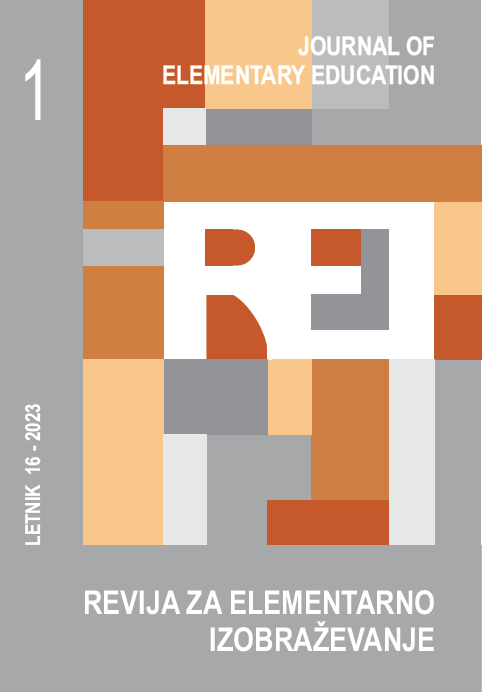Perspektive učiteljev o recepcijski zmožnosti mlajših učencev po poučevanju na daljavo v izrednih razmerah pandemije COVID-19
DOI:
https://doi.org/10.18690/rei.16.1.2687Ključne besede:
pandemija, poučevanje na daljavo v izrednih razmerah, pouk književnosti, recepcijska zmožnost, razlike med generacijamiPovzetek
Poučevanje na daljavo v izrednih razmerah pandemije COVID-19 je prineslo veliko novega in neznanega. Veliko raziskav je bilo posvečenih vplivu šolanja na daljavo na učne rezultate otrok, tudi na področju materinščine, še posebej opismenjevanju in pismenosti. Ta raziskava pa preiskuje področje poučevanja književnosti, natančneje učinek spremenjenega načina dela na recepcijsko zmožnost mlajših učencev. V preiskovalni študiji kvantitativne narave je sodelovalo 196 učiteljev. Njihovi odgovori kažejo, da med učenci prvega vzgojno-izobraževalnega obdobja prihaja do srednjih in večjih razlik na področju recepcijske zmožnosti v primerjavi z učenci, ki so se šolali pred pandemijo.
Prenosi
Literatura
Darling-Hammond, L., Schachner, A., and Edgerton, A. K. (2020). Restarting and Reinventing School: Learning in the time of COVID and beyond. Palo Alto, CA: Learning Policy Institute.
Engzell, P., Frey, A., and Verhagen, M. D. (2021). Learning loss due to school closures during the COVID-19 pandemic. Proceedings of the National Academy of Sciences of the United States of America, 118(71). https://doi.org/10.1073/pnas.2022376118.
Gunzenhauser, C., and Saalbach, H. (2021). First year of schooling during the pandemic: What did primary school students experience and what will they be facing now? Psychologie in Erziehung und Unterricht, 68, 280–286. http://doi.org/10.2378/peu2021.art18d.
Hodges, C., Moore, S., Lockee, B., Trust, T., and Bond, A. (2020). The difference between emergency remote teaching and online learning. Retrieved from https://er.educause.edu/articles/202–0/3/the-difference-between-emergency-remote-teaching-and-online-learning (Accessed: 5. 1. 2022).
Jauss, H. R. (1998). Estetsko izkustvo in literarna hermenevtika [Aesthetic Experience and Literary Hermeneutics]. Ljubljana: Literarno-umetniško društvo.
Kerneža, M. (2021). Učinki dela na daljavo na zmožnost branja in pisanja učencev v 1. vzgojno-izobraževalnem obdobju [Effects of distance learning on student's ability to read and write in the first educational period]. In A. Mlekuž and I. Ž. Žagar (Eds.), Raziskovanje v vzgoji in izobraževanju: Učenje in poučevanje na daljavo – Izkušnje, problemi, perspektive. Zbornik povzetkov 6. znanstvene konference (pp. 49–50). Ljubljana: Pedagoški inštitut.
Kordigel, M. (1999). Komunikacijski model književne vzgoje: poskus strukturiranosti recepcijske sposobnosti [Communication model of literary education: an attempt to structure the ability of reception]. Jezik in slovstvo, 44(5), 151–162.
Koritnik, A. (2015). Razvijanje recepcijske zmožnosti pri otrocih z lažjo motnjo v duševnem razvoju [Developing reception competence in children with a mild intellectual disability]. Journal of Elementary Education, 8(3), 39–57.
Kuhfeld, M., Soland, J., Tarasawa, B., Johnson, A., Ruzek, E., and Liu, J. (2020). Projecting the potential impact of COVID-19 school closures on academic achievement. Educational Researcher, 48(8), 549–565. https://doi.org/10.3102/0013189X20965918.
Legvart, P., Kordigel Aberšek, M., and Kerneža, M. (2021). Primary school students’ natural science digital literacy competence in digital learning Environments. In Lamanauskas, V. (Ed.), Science and Technology Education: Developing a global perspective: Proceedings of the 4th International Baltic Symposium on Science and Technology Education (BalticSTE2021), Šiauliai, 21-22 June 2021. (pp. 105–114). Šiauliai: Scientia Socialis. Retrieved from https://www.ceeol.com/search/chapt–er-detail?id=981550 (Accessed: 12. 12. 2022).
Magomedov, I. A., Khaliev, M. S. U., and Khubolov, S. M. (2020). The negative and positive impact of the pandemic on education. Journal of Physics: Conference Series, 1691 (1). https://doi.org/10.1088/1742-6596/1691/1/012134.
Meier Jæger, M., and Hoppe Blaabæk, E. (2020). Inequality in learning opportunities during Covid-19: Evidence from library takeout. Research in Social Stratification and Mobility, 68. https://doi.org/10.1016/ j.rssm.2020.100524.
Moore, M. G. (2013). Handbook of Distance Education. Routledge.
Muzaki, F. I. (2021). Digital language teaching in Indonesia: A framework on Covid-19 pandemics. Revista geintec-gestao inovacao e technologias, 11(2), 2167–2184. https://doi.org/10.47059/revista–geintec. v11i2.1867.
Özmen, B., and Atıcı, B. (2014). The effects of social networking sites in distance learning on learners' academic achievements. European Journal of Distance and E-Learning, 17(2), 61–75. https://doi.org/10.2478/eurodl-2014-0019
Pečenković, V., and Pašić Kodrić, M. (2021). Challenges of teaching children literature online in Bosnia and Herzegovina during the COVID 19 pandemic. World Journal on Educational Technology Current Issues, 13 (4), 806–815. https://doi.org/10.18844/wjet.v13i4.6266.
Pečjak, S. (2021). Bralna kultura s psihološke in vzgojno-izobraževalne perspektive [Reading culture from the psychological and educational perspectives]. Journal of Elementary Education, 14(4), 461–483.
Pestano Perez, M., Pesek, I., Zmazek, B., and Lipovec, A. (2020). Video explanation as a useful digital source of education in the COVID 19 situation. Journal of Elementary Education, 13(4), 395–412. https://doi.org/10.18690/rei.13.4.395-412.2020.
Picciano, A. G., and Seaman, J. (2009). K-12 Online Learning: A 2008 Follow up of the Survey of U. S. School District Administrators. Needham, M. A.: Sloan Consortium.
Poznanovič Jezeršek, M., Cestnik, M., Čuden, M., Gomivnik Thuma, V., Honzak, M., Križaj Ortar, M., Rosc Leskovec, D., Žveglič, M., and Ahačič, K. (2018). Program osnovna šola. Slovenščina. Učni načrt.
Pryor, J., Wilson, R. H., Chapman, M., and Bates, F. (2020). Elementary educators’ experiences teaching during COVID-19 school closures: understanding resources in impromptu distance education. Online Journal of Distance Learning Administration, 23(4). Retrieved from https://www.–westga.edu/~distance/ojdla/ winter234/ pryor_young_ chapman_ bates23–4.html (Accessed: 5. 1. 2022).
Rogers, P. L. (2009). Encyclopaedia of Distance Learning. Second Edition. Idea Group Inc. (IGI).
Stebbins, R. (2001): Exploratory Research in the Social Sciences. Thousand Oaks, CA: SAGE.
Vaillancourt, T., Szatmari, P., Georgiades, K., and Krygsman, A. (2021). The impact of COVID-19 on the mental health of Canadian children and youth. Facets, 6, 1628–1648. https://doi.–org/10.1139/facets-2021-0078.
Prenosi
Objavljeno
Številka
Rubrika
Licenca
Avtorske pravice (c) 2023 Maja Kerneža

To delo je licencirano pod Creative Commons Priznanje avtorstva 4.0 mednarodno licenco.
